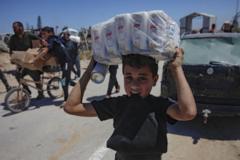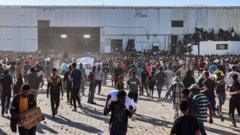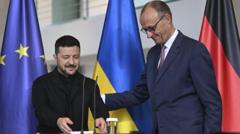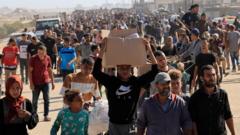EU leaders express concern over the humanitarian impact of Israeli strikes in Gaza, emphasizing the need for equitable aid distribution. The situation escalates with calls from multiple nations for Israel to modify its military strategies.
EU Condemns Israeli Airstrikes in Gaza as Civilian Casualties Rise

EU Condemns Israeli Airstrikes in Gaza as Civilian Casualties Rise
The European Union criticizes Israeli military actions in Gaza, calling them excessive, as the humanitarian crisis deepen amid ongoing hostilities.
The European Union's chief diplomat, Kaja Kallas, has expressed that the "Israeli strikes in Gaza go beyond what is necessary to fight Hamas," as the conflict's death toll soars. According to the Hamas-run health ministry, Israeli military actions since resuming hostilities in March have resulted in 3,924 casualties. Kallas explicitly criticized a U.S.-backed new aid distribution model that seeks to bypass traditional organizations like the United Nations, asserting, "We don't support the privatisation of the distribution of humanitarian aid. Humanitarian aid cannot be weaponised."
Recent comments from German Chancellor Friedrich Merz echoed these sentiments, with his declaration that he "no longer understands" Israel's objectives in Gaza. He stated, "The way in which the civilian population has been affected... can no longer be justified by a fight against Hamas terrorism." The EU, which is a significant source of humanitarian assistance for Gaza, has underscored that the majority of aid is currently blocked by Israeli restrictions. Kallas lamented, "The majority of the aid to Gaza is provided by the EU but it's not reaching the people as it is blocked by Israel," characterizing the ongoing suffering as "untenable."
In a broader context, the EU's position comes alongside growing criticism from the UK, France, and Canada, urging Israel to cease its offensive in Gaza. Following these developments, the UK announced the suspension of trade negotiations with Israel. The EU has initiated an assessment of its trade agreement with Israel, with Kallas set to present "options" for the upcoming EU foreign ministers meeting in Brussels on June 23.
The humanitarian crisis in Gaza has prompted UN agencies to warn of catastrophic levels of food insecurity impacting the enclave's 2.1 million inhabitants, exacerbated by an Israeli blockade that had limited aid for nearly three months. Meanwhile, a new aid distribution initiative, supported by Israel and the U.S., is characterized by controversy due to its avoidance of UN involvement—a move criticized by the UN as unethical.
Amid these tensions, Israeli Prime Minister Benjamin Netanyahu has reiterated plans to move Gaza’s populace to a "sterile zone" while military operations against Hamas persist, framing this as a voluntary emigration—an approach met with skepticism and resistance. This renewed military campaign was launched following Hamas’ surprise attack on October 7, 2023, resulting in approximately 1,200 fatalities and the abduction of 251 individuals. Current reports indicate that Gaza has suffered over 54,084 deaths since the conflict's escalation.




















